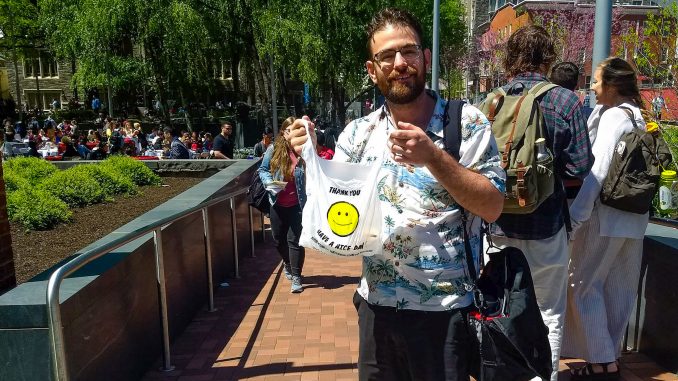
After backlash on Wednesday from food truck owners and patrons on Temple University’s campus, the city decided to delay ticketing and towing food truck vendors until it holds discussions with them over the summer.
On April 17, the university alerted vendors in Temple’s food truck district that the city’s Licenses and Inspections department would begin enforcing a 2015 ordinance that requires trucks to move from their parking spots at night, starting April 29. The city apologized on Wednesday for any “confusion or distress” the short enforcement date may have caused, wrote Karen Guss, a spokesperson for L&I, in a statement
“As the Department should have done prior to initiating enforcement of these provisions, L&I will engage over the summer with vendors and other stakeholders to explore and address their concerns,” Guss wrote.
The rule has applied to all trucks in the city since 2015, but due lack of resources, it hadn’t been enforced on Main Campus, a spokesperson for City Council President Darrell Clarke wrote in an email to The Temple News on Wednesday.
A petition directed at City Council to “Save Temple University Food Trucks” received more than 6,000 signatures as of Friday morning, and Evan Kassof, president of the Temple University Graduate Students Association, organized a demonstration at the university’s Student Barbecue on Wednesday.
“It’s just dollars and cents,” Kassof said. “They’re going to lose their business because they can’t afford the additional overhead and the headache it’s going to be like.”
Many vendors worry the cost and logistics of moving their trucks daily would not be possible for their small businesses.
Ergun Cimen, the owner of E&E Gourmet Express on Montgomery Avenue near Liacouras Walk, said if the city forced him to move his truck overnight, he would go out of business because he’d have to pay high overnight parking fees in a garage.
Cimen pays $1,000 per year for his parking spot on Main Campus to renew licenses, and estimated he would pay $3,000 more per month for a garage spot, he said. Additionally, it takes 15 minutes minimum to park the E&E truck, which would be difficult during early morning traffic on Montgomery Avenue, he added.
Some vendors like Cimen, whose truck has operated on Main Campus for 55 years, feel the university has not pushed back enough against city enforcement because it wants to promote its own dining options.
“The restaurants [on campus] complain about us,” Cimen said. “They say, ‘we don’t have business. Food trucks are cheap.’”
Saroun Nop, the owner of the Fresh Food and Smoothie truck on Montgomery Avenue near Broad Street, said he would like to stay on campus even if the ordinance is enforced, but feels as though the university has also pressured him to move. The Student Center’s food court, which was renovated in 2017, has become one of his truck’s main competitors, he said.
“It’s not easy for us to move at night,” said Nop, who has owned his truck on campus for 12 years. “When we move, [others] park here. That’s the problem. Last year they marked our spot, but who cares about marks on the street?”
Some students, like freshman Kelly Malone, who said she doesn’t eat at the food trucks often, won’t be affected if some trucks leave Main Campus.
“It would make sense if the trucks weren’t here, then people would have to go somewhere else,” Malone said. “It would make more money for the school if [students] were at the Student Center.”
It would be frustrating for students to have to relocate their favorite trucks on a daily basis, said Andrea Frie, a sophomore advertising major.
“It would be annoying for them to leave and come back every day. What if they didn’t get that spot every day,” she said. “…I heard about [the ordinance] last night, but what difference does it make if it hasn’t been a problem before?”
Freshman pre-medicine major William Figueiredo said he goes to the trucks for their convenience, and if that changed, he probably wouldn’t patronize them anymore.
“If they move, I won’t go out of my way to go to them,” Figueiredo said.
Hal Conte contributed reporting.


As a former student at Temple, and Editorial Editor of The Temple News, I am disappointed at the lunch truck controversy. The food available within the University was never even acceptable. Several of the lunch trucks offered clean, fresh food at areasonable price. Here’s hoping they don’t put some lunch trucks out of business.